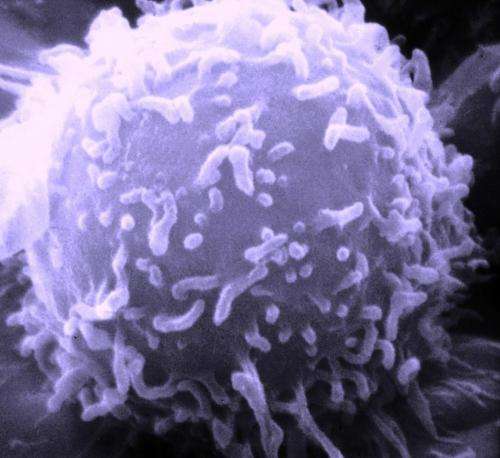January 14, 2016 report
Researchers find recurrent type of brain cancer tumor not a clone of the original

(Medical Xpress)—An international team of researchers has found evidence that shows that cancers that reoccur in patients with medulloblastomas are not necessarily derived from the same source as the original tumor. In their paper published in the journal Nature, the team describes genetic work they did with mouse models and then with whole-genome sequencing on human tumors, what they found and what they believe needs to happen to better treat patients going forward.
Medulloblastomas are a deadly form of cancerous tumor that forms in the part of the brain near the base of the skull—they are notably different from other brain tumors because they tend to spread to other parts of the brain and/or spinal column. They are also particularly aggressive and have a high rate of return when removed surgically and sadly, are diagnosed most often in children. In this new effort, the researchers sought to learn whether tumors that form after first onset tumors have been removed surgically, are genetically the same as the original tumor. This is important because treatments given after surgery are custom designed to fight off new tumor growth based on the genetic profile of the original tumor.
To find out, the researchers used the Sleeping Beauty transposon system to cause the development of Medulloblastomas in test mice. They then followed that up by mimicking the typical treatment progression prescribed for humans—approximately 60 percent of them relapsed. Tissue samples were retrieved from both the original and relapse tumors and sequencing was performed. The team reports that they were able to identify 23 common insertion sites in 11 original tumors and 40 in the recurrent tumors and that the insertion sites were "extremely different" between the two. The team then conducted whole genome sequencing on a small sample of human tumors, both original and recurrent. They report "striking" genetic differences between the original and recurrent tumors.
The researchers conclude by suggesting that recurrent medulloblastomas are not the result of re-growth of the original tumor but are instead likely the result of tumor growth from an unrelated sub-tumor that had not been targeted by treatments. They suggest that future clinical trials include additional biopsies to identify sub-tumors for targeting by separate treatments.
More information: A. Sorana Morrissy et al. Divergent clonal selection dominates medulloblastoma at recurrence, Nature (2016). DOI: 10.1038/nature16478
Abstract
The development of targeted anti-cancer therapies through the study of cancer genomes is intended to increase survival rates and decrease treatment-related toxicity. We treated a transposon–driven, functional genomic mouse model of medulloblastoma with 'humanized' in vivo therapy (microneurosurgical tumour resection followed by multi-fractionated, image-guided radiotherapy). Genetic events in recurrent murine medulloblastoma exhibit a very poor overlap with those in matched murine diagnostic samples (<5%). Whole-genome sequencing of 33 pairs of human diagnostic and post-therapy medulloblastomas demonstrated substantial genetic divergence of the dominant clone after therapy (<12% diagnostic events were retained at recurrence). In both mice and humans, the dominant clone at recurrence arose through clonal selection of a pre-existing minor clone present at diagnosis. Targeted therapy is unlikely to be effective in the absence of the target, therefore our results offer a simple, proximal, and remediable explanation for the failure of prior clinical trials of targeted therapy.
© 2016 Medical Xpress


















